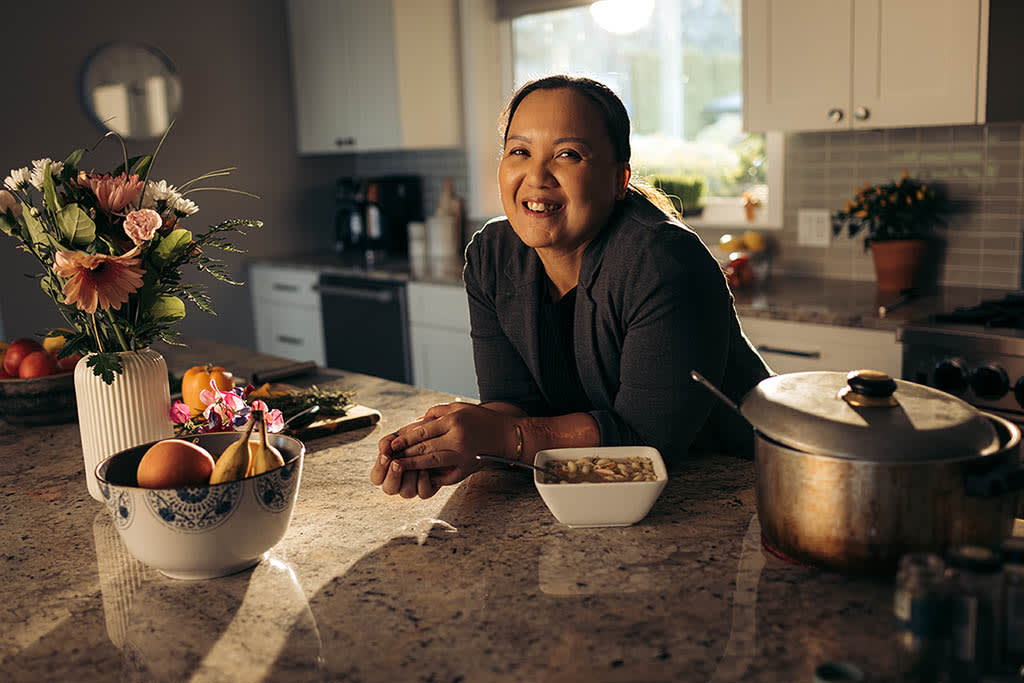
Join Roger in improving outcomes for the 80,000 people in B.C. facing cancer by donating today at GoBeyondBeliefBC.ca
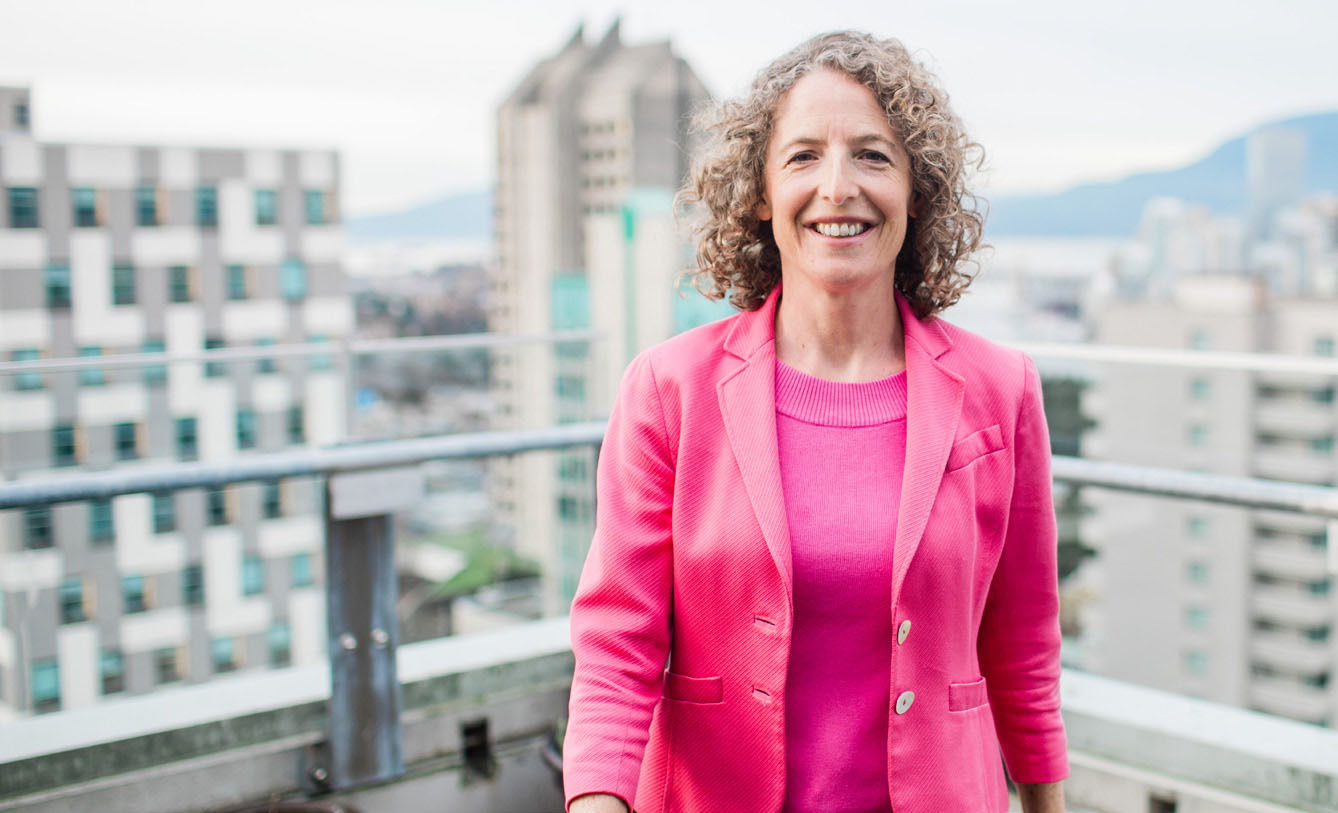
Sarah Roth, President & CEO, BC Cancer Foundation
Life beyond cancer means something different for everyone who has been impacted by this disease.
It can be a monumental achievement such as climbing a mountain or the simple joy of pushing your child on a swing set. For oral cancer survivor Rosalyn Salanguit it’s making Sopas, a traditional Filipino soup, for family and friends — and for the lucky crew during the photo shoot for this magazine. For Roger Gouin it’s honouring a 55-year love story by supporting research such as the groundbreaking innovations in lung cancer to improve outcomes for future generations.
With your support, we are fuelling these opportunities — and many more, both big and small but all incredibly important to the families facing cancer across B.C.
Ensuring BC Cancer’s world-class care reaches everyone in every corner of the province has always been at the heart of our work. Last month, I had the extreme pleasure of attending announcements regarding two new BC Cancer centres in the Fraser region, including the official groundbreaking of a second centre in Surrey which is on its way to serving the rapidly growing community.
While access to life-saving chemotherapy, radiation and other treatment is crucial, it’s not all there is to cancer care. Life doesn’t always seamlessly pick up for patients, even those given the all clear. Many are left with debilitating depression, anxiety and other mental health side effects.
The Foundation is proud to be fundraising for a new supportive care space, the BC Cancer – Victoria Integrated Care and Research Pavilion to help patients heal whole and healthy or find peace in the precious added years they’re afforded through treatment.
Together, we can reach for a life beyond cancer for everyone who dreams it. The sky’s the limit as to what we can accomplish — whether we grasp it from atop a high peak or a neighbourhood playground.
Sarah Roth
President & CEO, BC Cancer Foundation

Roger Gouin remembers the first time he laid eyes on his late wife Peggy like it was yesterday.
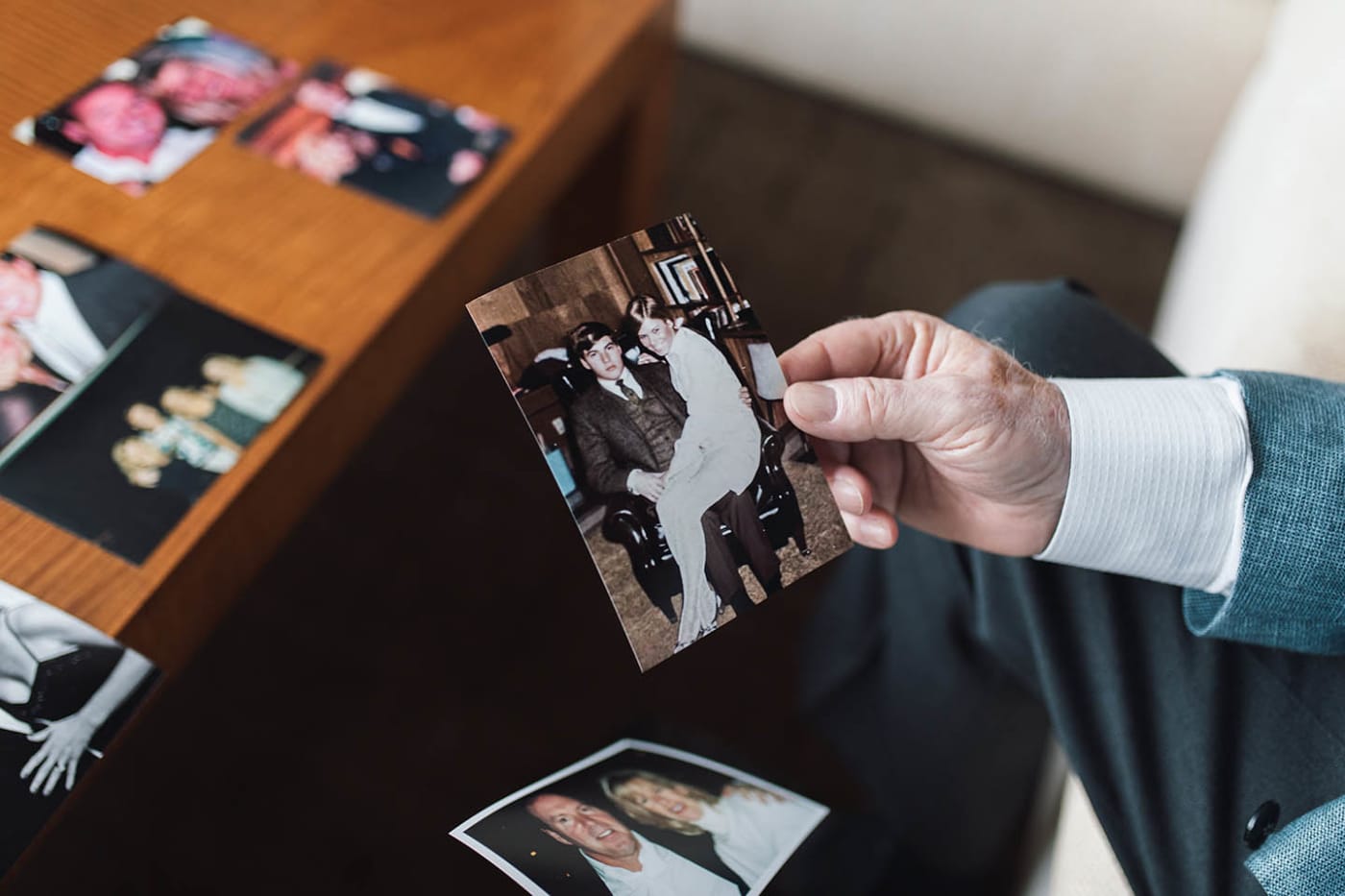
“It was September 1966. We were both at a brand new school. I was in English 10 and she walked into the classroom wearing this white shirt with her last name on the back. I took out my pencil and wrote it down, D…U…B…E…N…S…K…Y. That weekend, I asked her out. We were together ever since.”
The high school sweethearts spent the last six and half years of their 55-year relationship facing Peggy’s myelofibrosis diagnosis, a rare blood cancer that developed into the leukemia that took her life in 2021.
Those final years — despite endless blood transfusions, a bone marrow transplant and a clinical trial that kept them apart for a month during the pandemic — were a gift, says Roger, and one that he’s paying forward by generously donating to the BC Cancer Foundation.
“My Peggy would have passed a lot sooner had it not been for BC Cancer, I can’t thank them enough.”
Knowing their time was limited, Peggy and Roger cherished every moment. Travelling as much as they could, distracting themselves with a home renovation, watching a movie, having a cup of coffee, going for a walk. It didn’t matter as long as we did it together, says Roger.
“Being with Peggy, even when she was sick, was always a joy. Even when it got so that my car almost drove itself to the hospital we’d crank up the music, and sing or have a nice conversation.”
“Peggy was impressive. And not just the way she looked — although she was stunning. How she ended up with me, I’ll never know,” Roger laughs. “She always surprised me. She just kept improving, advancing and you can’t help but respect that. After we had our daughters, she went back to school and got a law degree and practiced for 25 years. At the end of her career, she mostly worked for free for the elderly or people who couldn’t afford it.”
Roger says he would give anything to have Peggy back. But he knows that even though that isn’t possible she’d encourage him to keep giving anyway to help improve outcomes for others facing cancer.
Unfortunately, my time to give to support research for Peggy has passed, he says, but with cancer affecting one in two of us, it has, and will continue to impact people I love. “I still have time to give for other people who may one day face this disease — now I give for them, for our girls or for our grandson.”
“When you grow up with someone — from when you were a teenager — you think that it will last forever. After you’ve lost that person, your best friend, your angel, what do you do? You try and help the next person. I know that’s what Peggy would want.”
Join Roger in improving outcomes for the 80,000 people in B.C. facing cancer by donating today at GoBeyondBeliefBC.ca

BC Cancer Foundation supporters gather to announce the new supportive care space.
While radiation and chemotherapy eradicated Angus Matthews’ throat cancer, the nutrition support and speech therapy he received at BC Cancer – Victoria were a big part of what saved his life.
“I just couldn’t eat. It was so difficult. I was at the point where I was going to be hospitalized,” he says of the ravaging side effects of his treatment two years ago.
The nutrition team at BC Cancer – Victoria guided Angus through the incredibly challenging time. “It was beyond just what to eat; they saved my life,” he says. He also credits his speech therapists with “making my throat work for me again,” — something he put to good use when he made a speech to help launch the BC Cancer Foundation’s $15 million fundraising campaign to establish the BC Cancer – Victoria Integrated Care and Research Pavilion and support cutting-edge research and clinical trials on the Island.
Less than 250 metres from BC Cancer – Victoria’s existing facilities, the 12,000-square foot building will house many of the centre’s Supportive Care services including the nutrition support Angus benefitted from as well as psychiatry and counselling. Crucial to recovery, these mental health services don’t kill cancer cells but they help patients get to the appointments where this life-saving work happens.
Supportive Care services at BC Cancer help patients and their families prevent or manage the adverse side effects of cancer and its treatment — both physical and psychological — from diagnosis through treatment, and into survivorship or end-of-life care. They include programs like Patient & Family Counselling, Hereditary Counselling, Medical Genetics and Nutrition.
Not only do Supportive Care services increase survival rates, they are essential in improving quality of life. And research shows that accessing supportive care separate from where they received treatment, which can be triggering, helps ease patients’ anxiety, stress and fear.
Marking the Foundation’s largest campaign ever on the Island, this is the first time in history that donors will fully fund the purchase and renovation of a building to increase access to cancer care.
As the home of the donor-founded and funded Deeley Research Centre — a national leader in CAR-T immunotherapy research — the historic campaign will also support BC Cancer – Victoria’s work as a world-renowned pioneer in one of the largest priority areas in cancer research.
“The new building is a critical expansion of BC Cancer – Victoria’s campus,” says Kelly Nystedt, executive director, BC Cancer – Victoria. “It will enable us to greatly enhance the care we deliver to Vancouver Island patients, while also supporting our integrated research programs that benefit patients both on the Island and beyond.”
The local community has shown tremendous support with a $2.5 million gift from Ernie and Yvonne Yakimovich and $500,000 from the campaign’s honourary co-chairs Lynda and Murray Farmer.
“We have continuously been impressed by the work done at BC Cancer – Victoria in terms of both research and care,” says Ernie and Yvonne Yakimovich, local business leaders and owners of E Y Properties in Victoria. “Being from the real estate sector, we recognize what an incredible opportunity it is to purchase this building and it was an easy decision to support the BC Cancer Foundation in making it a reality.”
“This is a significant opportunity to help shape the delivery of cancer care and support in our community and throughout Vancouver Island,” adds Lynda Farmer. “As a donor, it is empowering to know that our contribution to this important development can be life changing for those facing cancer.”
“Every cancer is your own personal experience,” says Angus, and everyone comes out of the journey affected differently. “The supportive programs to be located in the new building were essential to my care, and I know they will help many others.”
To help us reach our fundraising goal, and make space for life-saving supportive care at the BC Cancer – Victoria Integrated Care and Research Pavilion, contact William Litchfield 250.667.8690 or william.litchfield@bccancer.bc.ca
The Bannister family – a name Okanagan residents may recognize from their namesake Bannister Automotive Group – have made an incredibly generous gift of $1.5 million to the BC Cancer Foundation’s campaign to bring a new, state-of-the-art systemic therapy suite to BC Cancer – Kelowna.
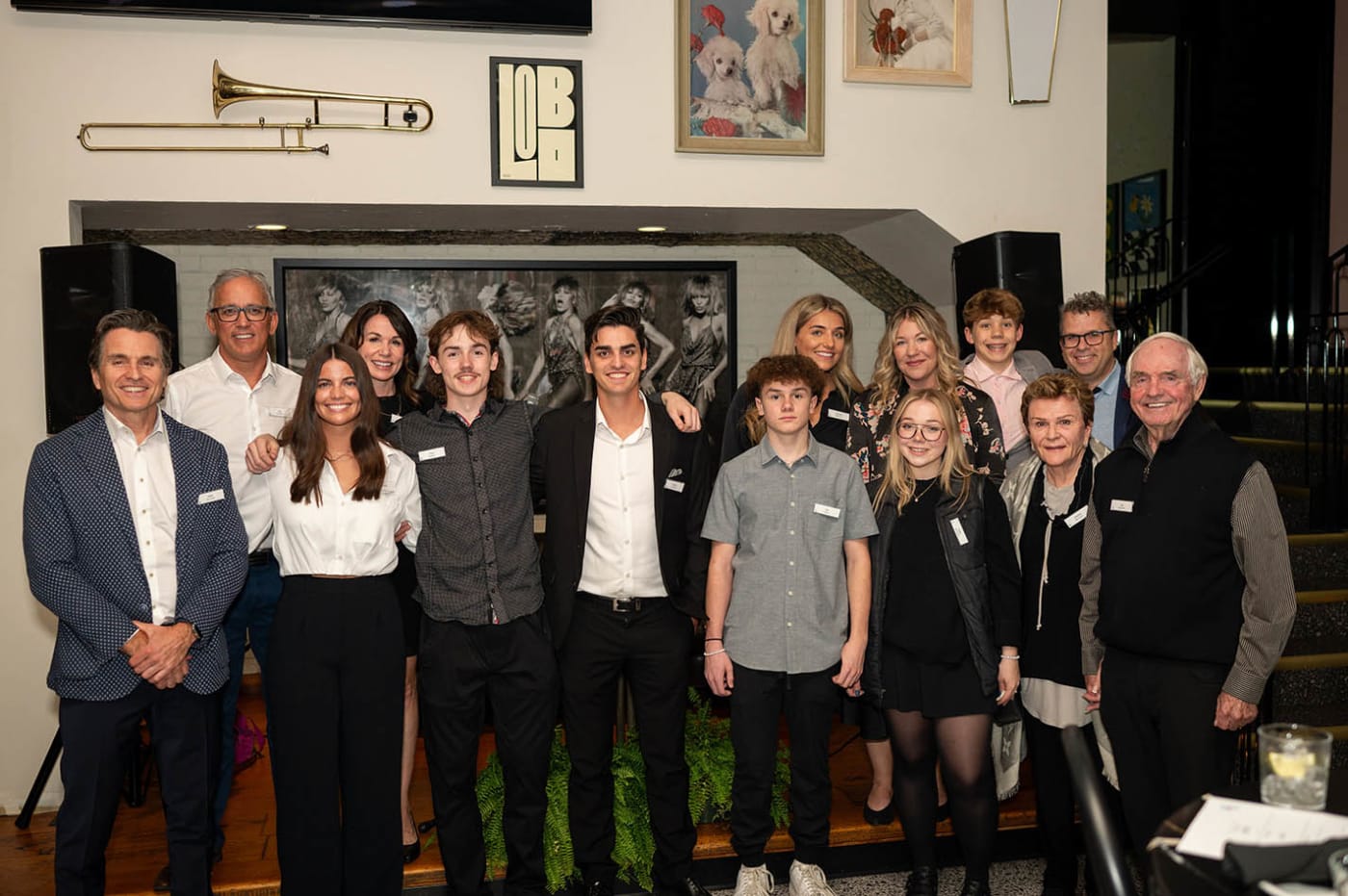
The Bannister family.
“The work done by BC Cancer – Kelowna’s dedicated staff as they both provide care to current patients and conduct the innovative research needed to improve outcomes is nothing short of remarkable. With three generations of our family living in the Okanagan, we know the importance of having world-class cancer care close to home and are proud to help ensure this continues to be available for our communities for the generations to come,” says Chad and Lyn Bannister on behalf of the family.
Long-time supporters of the Foundation, the Bannisters also recently helped establish BC Cancer – Kelowna’s Brachytherapy Chair role, held by Dr. Juanita Crook.
The new suite is essential to meeting the growing demand for cancer treatments in the Interior, while also providing the infrastructure to bring early phase clinical trials to Kelowna for the first time. This will ensure patients have timely access to the latest life-saving treatments closer to home and establish Kelowna as a centre for excellence in patient-focused care.
“The Bannister family’s gift will have an incredible impact on how we’re able to treat patients in the Interior,” says Dr. Ross Halperin, BC Cancer – Kelowna’s Executive Medical Director. “This is an incredibly exciting time for cancer research and we’re proud to be among the busiest clinical trials site in the province. This donation will help us expand even further and be at the forefront of the most important areas of research, like immunotherapy.”
To join the Bannisters in transforming cancer care in the Interior, contact Pardeep Khrod at 250.878.5490 or pardeep.khrod@bccancer.bc.ca

Country Meadows’ Gerry Towne (left) and Dave Mickie present Dr. Marianne Sadar (middle) with a cheque from the proceeds of the 2023 tournament.
“The saying, ‘Never doubt that a small group of thoughtful, committed individuals can change the world. In fact, it’s the only thing that ever has,’ likely wasn’t referring to a charity golf tournament,” says BC Cancer Foundation President & CEO Sarah Roth. “And yet, that’s exactly what Country Meadows Senior Men’s Golf Club has done in their 23 years of incredible support.”
Richmond’s Country Meadows Charity Golf Classic has raised more than $1.6 million to fuel BC Cancer’s Dr. Marianne Sadar’s groundbreaking prostate cancer research — including the discovery of a new drug, currently showing great promise in clinical trial.
Back in 1999, Dr. Sadar discovered that an androgen receptor might be the driver of prostate cancer growth in patients who had undergone treatment to reduce testosterone, which had kept the disease at bay initially. Thanks to the Country Meadows’ team, who leapt in with early investment, she proved her theory and the breakthrough was covered by media around the world.
“Calls came from the U.K., the U.S. and other countries. Patients came to my door. It was bittersweet because now we had an idea about what was causing the cancer to grow but I needed to test about 60,000 drugs to find one or two potential candidates to develop further. This would take my lab 30 years, for which it would be impossible to find funding. Little did I know that Country Meadows would make my dream a reality,” says Dr. Sadar.
The golf charity purchased state-of-the-art robotics for Dr. Sadar’s lab that accelerated the drug discovery process to just a few years. In 2010, her research revealed a new class of drugs that could help patients with advanced prostate cancer. Five years later, the first drug to be discovered and developed at BC Cancer for clinical trial went into testing for patients whose cancer had evaded other treatments.
The drug showed signs of working, and an even better, second-generation version developed in 2020 is currently in clinical trials.
“Country Meadows dedication, passion and desire to make a difference has accelerated my research by decades. Without their support the discovery of this new drug would not have happened. If this potentially life-saving treatment is successful it will be thanks to them, and the game of golf.”
To support BC Cancer’s world-leading prostate cancer research please contact Rhea Siu at 604.675.4108 or rhea.siu@bccancer.bc.ca.
Few would consider accidentally biting their tongue lucky. But for Rosalyn Salanguit, the minor but annoying injury saved her life.
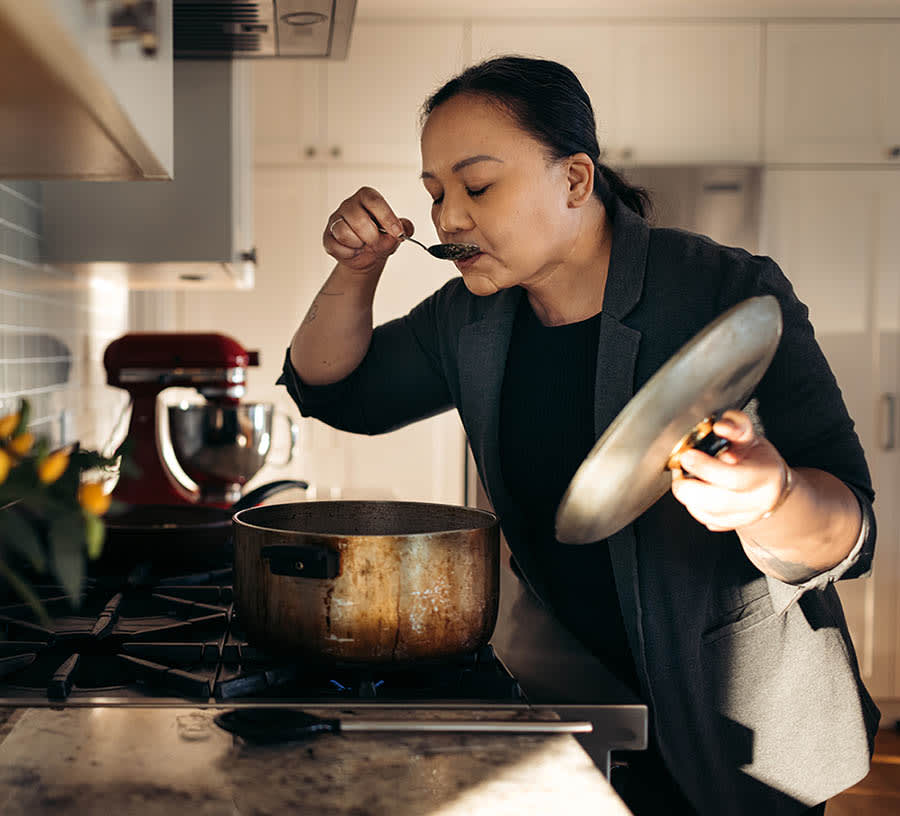
Oral cancer survivor Rosalyn Salanguit is able to pursue a passion for food again.
The wound, suffered in the spring of 2015 while Rosalyn was eating lunch, refused to heal for months. After unsuccessfully treating it with painkillers, Rosalyn visited her dentist in October. He took one look and immediately sent her to pathology, where she was diagnosed with Stage 2 tongue cancer.
By the time Rosalyn had surgery two months later, the disease had advanced to Stage 4 and required the removal of half her tongue, a graft (using tissue and an artery from her forearm) and a neck dissection to extract 47 lymph nodes to which the cancer had spread. Chemotherapy and radiation followed. As did another surgery to remove two teeth to save her jaw.
“My doctors warned I might not speak or eat without a feeding tube again,” says Rosalyn. Eight years later, she’s doing both (just not at the same time) thanks to her team at BC Cancer – Vancouver.
“I was fortunate to access oral cancer care close to home, supported by my family and friends,” she says. But for 40% of the patients currently seen at BC Cancer – Surrey, for whom it’s necessary to travel long distances from other areas in the Fraser Valley, this is not yet the case.
However, thanks to the generosity of BC Cancer Foundation donors, a new Oral Oncology and Dentistry Clinic at BC Cancer – Abbotsford is near completion. The state-of-the-art two chair clinic will be the only one in the province with direct access to an operating room for complex reconstructive surgical procedures.
The final step is to equip the clinic with a critical piece of equipment — a Cone Beam CT (CBCT), essential for reconstructive procedures, surgical planning, and advancing early detection.
Oral cancer survival rates drop from 80% to 20% in late-stage diagnoses, which can also result in significant disfiguration that takes a tremendous psychological toll on patients’ quality of life, says Dr. Suzanne Carlisle, BC Cancer department head, Oral Oncology/Dentistry Surrey.
“I see heartbreaking cases — people with facial deformities and people who haven’t been able to eat solid food for years. We need to address their oral health needs so they can eat, smile and be healthy again.”
In addition to assisting in early detection and recurrences by enabling the most accurate tracking of changes to a person’s cancer, a CBCT aids in treatment planning, diagnosis and managing cancer-specific infections. It also helps to expedite care and reduce the number of offsite referrals (decreasing waitlists and patient anxiety associated with waiting for an appointment or diagnosis) by affording clinicians quick and easy access to images without the extra step of coordinating with external clinics.
“With a CBCT on site, we can interpret results within seconds and, if needed, immediately send patients to specialists for subsequent treatment. Imaging from CBCT will allow us to plan three-dimensional designs of surgical care for procedures performed in Abbotsford’s operating room,” says Dr. Carlisle.
Oral cancer rates typically increase with age, tobacco and alcohol use. However, the disease is becoming more common in young people like Rosalyn, who was just 35 when she was diagnosed. It’s also more prevalent in South Asian, Chinese and First Nations populations. In the South Asian community one in 150 people (compared to one in 800 in the general population) are at higher risk. With South Asians representing 10% of B.C.’s population, many of whom call the Fraser Valley home, bolstering oral cancer care at BC Cancer – Abbotsford is crucial to improving cancer outcomes in the community.
To help bring this state-of-the-art Oral Oncology and Dentistry Clinic to Abbotsford, please contact Scott MacDonald at 604.851.4736 or scott.macdonald@bccancer.bc.ca.
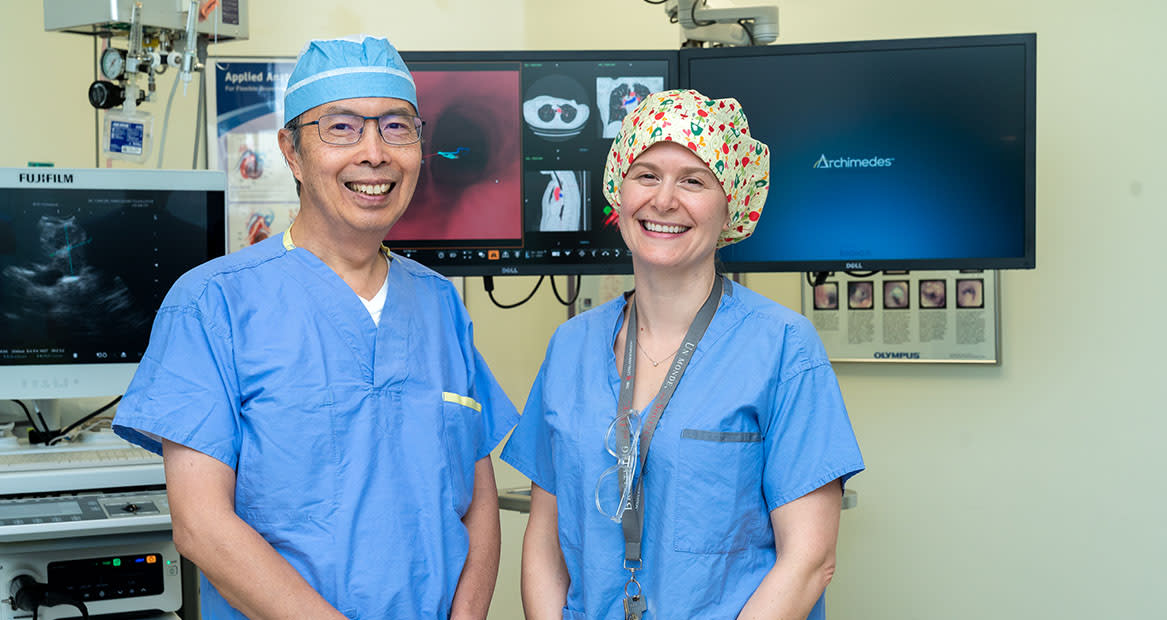
Drs. Stephen Lam and Renelle Myers
As the most commonly diagnosed cancer, lung cancer accounts for a quarter of all cancer deaths — more people will die from lung cancer this year than from colorectal, pancreatic and breast cancers combined.
This is due to the fact that most patients are referred to BC Cancer once they’ve developed symptoms. As a result, nearly half of lung cancer cases are detected in Stage 4 after the cancer has metastasized. The five-year survival rate for the disease is 62% in Stage 1 but drops to just 3% in Stage 4.
Led by Dr. Stephen Lam and Dr. Renelle Myers, BC Cancer’s lung cancer research team are globally recognized — presenting at international conferences and publishing in various peer-reviewed journals — for their work to prevent and cure lung cancers and stop tumour resistance and recurrence. The Vancouver-based team are currently focused on a number of innovative research projects and programs to advance early detection of lung cancer, when it’s highly treatable.
A year after BC Cancer established Canada’s first province-wide lung cancer screening program — proudly supported by the BC Cancer Foundation with almost $2 million in equipment and start-up funding — the program has achieved enormous success, outperforming similar initiatives in the U.S., and resulting in 66 confirmed cancers.
“All of these cancers were found in people who do not have symptoms suspicious of lung cancer such as hemoptysis (coughing up of blood), chest pain, weight loss or a change in breathing,” says Dr. Stephen Lam, medical director of BC Cancer’s lung cancer screening program and Leon Judah Blackmore Chair in Lung Cancer Research.
“Approximately 71% of the cancers identified are in early Stage 1 or 2. Only 11% are in Stage 4, compared to the almost 50% we would see in clinically diagnosed lung cancer cases,” says Dr. Lam.
To be eligible for the program, available to high-risk individuals at 36 sites across the province, patients need to meet criteria such as age (55-74) and have a history of smoking for 20 years or more. However, non-smokers account for almost 30% of BC Cancer’s lung cancer patients.
“There is an urgent need to create a risk-prediction tool to identify the people who don’t use tobacco, yet are at increased risk of developing lung cancer,” says Clinical Scientist Dr. Renelle Myers.
BC Cancer’s lung cancer research team recently received two large multi-institution grants to develop and test a novel breath test that will harness artificial intelligence (AI) to help address gaps in early lung cancer detection to reach a more diverse population. New research at BC Cancer also suggests lifetime exposure to air pollution, specifically a fine particle called PM2.5, could be increasing lung cancer risk especially in women. Just as UV exposure causes skin cancer, exposure to dangerously high levels of PM2.5 in the air we breathe such as from forest fire smoke, is being linked to lung cancer.
Utilizing the power of AI, BC Cancer’s lung cancer team is developing a breath test to identify chemical signatures in breath to help detect early lung cancer and understand how changes in the lung microbiome may indicate lung cancer development in never smokers. Essential in meeting the demands of processing breath samples for these studies is the GC Orbitrap Exploris.
This state-of-the-art technology is a “work horse to study exhaled breath chemicals,” says Dr. Myers, and the machine is desperately needed to analyze the high volume of samples for several innovative projects.
“Even if our team works 24/7, we couldn’t process all the samples required for these large, multi-centre studies with only the system we have now, says Dr. Lam, “especially since samples can’t be stored for very long once collected.”
The BC Cancer Foundation is seeking to raise $500,000 to purchase and install a new GC Orbitrap Exploris to fuel BC Cancer’s life-saving work.
“Lung cancer used to be viewed as a tobacco user’s disease, but it’s not,” says Dr. Myers. “Anyone with lungs can get lung cancer. We have to look harder at how our environment affects our lung health.”
Innovative early detection methods, and the power of AI, are helping BC Cancer’s team come closer to one day achieving this for everyone in B.C.
To learn more about how you can support BC Cancer’s world-leading research in early lung cancer detection please contact Elissa Morrissette at 604.707.5992 or elissa.morrissette@bccancer.bc.ca.
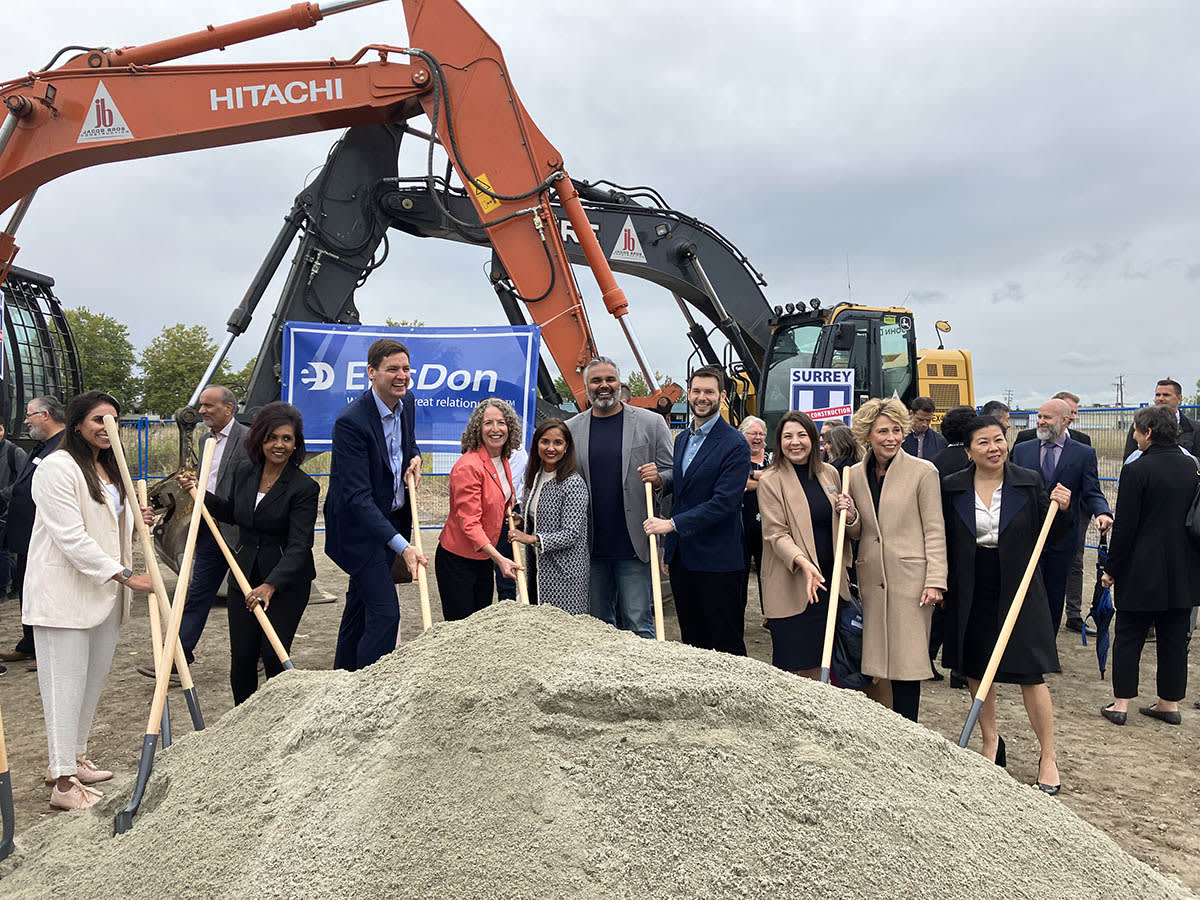
BC Cancer Foundation President & CEO Sarah Roth is flanked by other leaders in the community thrilled to be breaking ground for a second BC Cancer centre in Surrey.
A second BC Cancer centre in Surrey has officially broken ground — welcome news to the rapidly growing city in a region that will soon be home to the highest number of new cancer diagnoses in B.C.
Joining six other BC Cancer centres across the province, the new centre will feature 50 exam rooms, 54 chemotherapy spaces (doubling treatment capacity in the region), specialized imaging labs and radiation therapy spaces, and will bring first-in-the-region, and in the province, treatment and technology to Fraser Valley patients.
Proudly fundraising $30 million to help make this new BC Cancer centre a reality, BC Cancer Foundation President & CEO Sarah Roth says, “This state-of-the-art facility heralds a new era of hope for families facing cancer in the surrounding communities. In addition to offering critical, close-to-home care, it will draw the very best to B.C. who, in collaboration with other cancer centres, will build on research breakthroughs.”
The new BC Cancer centre in Surrey will include:
“Half of all cancer patients will receive radiation therapy at some point in their journey,” says Dr. Devin Schellenberg, provincial lead for radiation oncology at BC Cancer. “The result is nearly 167,000 radiation therapy visits per year by British Columbians who require timely access to better their survival and quality of life.”
“This new centre will help us meet those life-saving needs — and advance our treatment options, capacity, equipment and expertise to support British Columbians facing this disease now, and well into the future.”
To support the new BC Cancer centre in Surrey contact Scott MacDonald at 778.874.6017 or scott.macdonald@bccancer.bc.ca